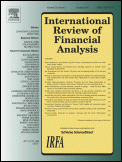
International Review of Financial Analysis
Scope & Guideline
Connecting empirical studies to critical financial challenges.
Introduction
Aims and Scopes
- Financial Risk Management:
The journal covers methodologies and empirical studies related to measuring and managing financial risks, including market, credit, and operational risks. - Corporate Finance and Governance:
Research on corporate finance practices, governance structures, and the impact of managerial decisions on firm performance is a core focus area. - Sustainable Finance and ESG Factors:
The journal increasingly emphasizes the role of environmental, social, and governance (ESG) factors in finance, exploring how these elements influence investment decisions and corporate behavior. - Behavioral Finance:
Papers examining the psychological factors affecting investor behavior and market outcomes are prevalent, highlighting the interplay between sentiment and financial markets. - Technological Innovation in Finance:
The integration of technology in financial services, including FinTech innovations, machine learning applications, and their implications for traditional finance, is a significant area of research. - Global Financial Markets and Institutions:
The journal analyzes the dynamics of global financial markets, including cross-border investment flows, market integration, and the influence of geopolitical events.
Trending and Emerging
- Integration of AI and Machine Learning:
There is a growing trend of incorporating artificial intelligence and machine learning techniques to enhance financial modeling, risk assessment, and predictive analytics. - Sustainable Investments and Green Finance:
Research on sustainable finance, particularly the impact of ESG factors on investment decisions and firm performance, is increasingly prevalent, reflecting global trends in responsible investing. - Impact of COVID-19 on Financial Markets:
Studies analyzing the effects of the COVID-19 pandemic on various aspects of financial markets and corporate behavior are emerging, emphasizing the need for resilience and adaptation. - Cross-Market Connectedness:
Research focusing on the interconnectedness between different financial markets, including cryptocurrency and traditional asset classes, is gaining traction. - Digital Finance and Blockchain Applications:
The exploration of digital finance, including cryptocurrencies, blockchain technology, and their implications for financial systems, is a rapidly growing area of interest. - Behavioral Insights in Investment Decisions:
Increasing attention is being paid to the behavioral aspects of finance, particularly how investor sentiment and psychological factors influence market dynamics.
Declining or Waning
- Traditional Market Analysis:
Research focused solely on traditional market analysis techniques without incorporating emerging technologies or behavioral insights seems to be less frequent. - Purely Theoretical Models:
There appears to be a shift away from purely theoretical models that lack empirical validation, with more emphasis on studies that connect theory to real-world applications. - Sector-Specific Studies:
Papers focusing on niche sectors of finance or isolated financial phenomena are becoming less common, as the journal increasingly favors broader, integrative analyses. - Historical Financial Analysis:
Research that primarily examines historical financial data without contemporary relevance or application is declining, reflecting a trend towards more current and applicable research.
Similar Journals
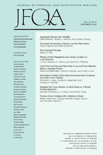
JOURNAL OF FINANCIAL AND QUANTITATIVE ANALYSIS
Pioneering Quantitative Methods for Financial ExcellenceJOURNAL OF FINANCIAL AND QUANTITATIVE ANALYSIS, published by Cambridge University Press, is a premier peer-reviewed journal that has been at the forefront of the finance and economics fields since its inception in 1966. With a notable impact factor reflecting its Q1 status in Accounting, Economics and Econometrics, and Finance for 2023, the journal is recognized for its substantial contributions to both theoretical and empirical research. Researchers and practitioners alike benefit from its comprehensive scope, addressing critical issues in financial analysis and quantitative methods. Although the journal does not currently offer open access, it remains widely accessible through institutional subscriptions. The editorial team is committed to fostering rigorous academic discussions that shape the future of finance and economics, making it an essential resource for academics, students, and industry professionals seeking to deepen their understanding of these vital disciplines. For more than five decades, this journal has continued to be an indispensable platform for disseminating influential research, thus solidifying its role as an essential cornerstone in the financial and quantitative analysis community.
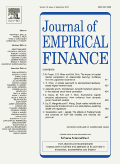
Journal of Empirical Finance
Empowering finance through rigorous empirical research.Journal of Empirical Finance, published by Elsevier, stands as a key resource in the areas of finance and economics, with a definitive focus on empirical studies. As a prominent journal since its inception in 1993, it has made significant strides in contributing to the academic community, evidenced by its soaring categorization in Q1 for Finance and Q2 for Economics and Econometrics as of 2023. With an ISSN of 0927-5398 and an E-ISSN of 1879-1727, the journal emphasizes robust, data-driven analysis to inform both theoretical and practical aspects of financial research. While access options do not include open access, the journal ensures that its content remains accessible to a diverse audience of researchers, professionals, and students. It fosters a platform for innovative research and discourse, significantly impacting the fields of finance, economics, and econometrics. The Scopus rankings further bolster its reputation, placing it in the 61st percentile in both categories, reflecting a commitment to high-quality research output. As the journal continues to evolve, it invites contributions that push the boundaries of empirical finance, enabling a deeper understanding of financial mechanisms that drive global economies.

International Journal of Financial Studies
Fostering collaboration and insight in financial studies.The International Journal of Financial Studies is a premier publication dedicated to advancing the field of finance through open-access research. Published by MDPI based in Switzerland, this journal offers researchers, professionals, and students a platform to disseminate their findings in an accessible format since its establishment in 2013. With its ISSN of 2227-7072 and a commendable impact reflected in its Q2 ranking in finance, it occupies an influential position among finance-related journals, as evidenced by its 65th percentile rank in Scopus. The journal encompasses a wide array of topics in finance, making it essential reading for those seeking to stay abreast of current research trends and methodologies. As an open-access journal, all articles are freely available, significantly enhancing the visibility and reach of published studies, which is crucial for fostering collaboration and innovation within the global financial community. Published continuously until 2024, the International Journal of Financial Studies is not just a source of knowledge; it is a critical contributor to the progression of financial scholarship.

Pacific-Basin Finance Journal
Connecting Research and Practice in Pacific FinancePacific-Basin Finance Journal is a prestigious academic journal that focuses on critical developments and innovative research within the fields of finance and economics, specifically tailored to the Pacific region's unique economic landscape. Published by Elsevier, the journal boasts an impressive impact factor and is categorized in the Q1 quartile for both Economics and Econometrics and Finance as of 2023. This indicates its high relevance and position among the top journals in its field, with Scopus rankings reflecting a strong standing in the competitive landscape of finance research, holding the 45th position out of 317 in Finance and the 108th in Econometrics. Established in 1993, the journal is committed to disseminating rigorous theoretical and empirical research findings that enhance the understanding of financial systems in the Pacific Basin. Although the journal is not open access, it provides invaluable insights and comprehensive studies aimed at professionals, researchers, and students alike, fostering a deeper comprehension of the region's economic dynamics and global interconnectedness.
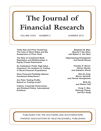
JOURNAL OF FINANCIAL RESEARCH
Exploring the Frontiers of Financial InnovationThe JOURNAL OF FINANCIAL RESEARCH, published by WILEY, stands as a pivotal platform for disseminating innovative research in the fields of finance and accounting since its inception in 1978. With an ISSN of 0270-2592 and an E-ISSN of 1475-6803, this journal aims to address contemporary challenges and trends within the financial research landscape. It has achieved notable recognition, being placed in the Q2 category for both Finance and Accounting in the 2023 rankings, signifying its relevance and impact within the academic community. Although it does not currently offer open access, the journal is accessible through various academic databases, catering to a diverse audience of researchers, professionals, and students keen on advancing their knowledge and understanding of financial systems and methodologies. With an evolving scope that encompasses empirical studies, theoretical frameworks, and practical applications, the JOURNAL OF FINANCIAL RESEARCH is committed to contributing valuable insights into the complexities of financial practices and policies.
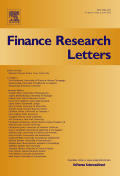
Finance Research Letters
Driving excellence in finance through impactful scholarship.Finance Research Letters, published by Academic Press Inc Elsevier Science, is a leading journal in the field of finance, recognized for its exceptional impact as indicated by its Q1 ranking in the Finance category of the Scopus Index, placing it in the top 6% of journals in this area. With an ISSN of 1544-6123 and an E-ISSN of 1544-6131, this journal has been a crucial platform for disseminating cutting-edge research since its inception in 2004. It covers a wide array of topics within finance, including but not limited to portfolio management, risk assessment, and financial innovation, making it an invaluable resource for researchers, professionals, and students committed to advancing their understanding of the financial sector. Although it does not currently offer open access, its contributions to the field are amplified by its impressive Scopus rank of #19 out of 317 in the Economics, Econometrics and Finance category. As the journal continues through its convergence years until 2024, it remains dedicated to publishing high-quality, peer-reviewed articles that reflect the latest trends and innovations in financial research.
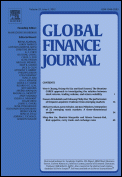
Global Finance Journal
Uncovering insights that shape financial landscapes.Global Finance Journal is an esteemed periodical published by Elsevier, dedicated to the dynamic fields of finance and economics. With an impressive history spanning from 1989 to 2024, this journal holds a significant position in the academic community, boasting a Q1 quartile ranking in both Economics and Econometrics, as well as Finance, as of 2023. It is highly regarded in Scopus rankings, placing 40th out of 317 in Finance and 99th out of 716 in Economics and Econometrics, demonstrating its influence and reach among researchers and practitioners alike. Although not an open-access journal, the Global Finance Journal provides rigorous peer-reviewed articles that explore critical issues, advance theoretical frameworks, and address practical applications in global finance. As such, it serves as a vital resource for researchers, financial professionals, and students aiming to deepen their understanding of economic phenomena and contribute to the ongoing discourse in these vibrant disciplines.
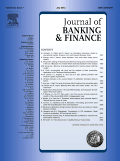
JOURNAL OF BANKING & FINANCE
Advancing the Frontiers of Financial KnowledgeWelcome to the Journal of Banking & Finance, a premier publication in the fields of finance and economics, expertly published by Elsevier. With its esteemed Q1 ranking in both the Economics and Econometrics and Finance categories for 2023, this journal frequently garners significant attention from researchers, professionals, and academics alike. Established in 1977, it has become a crucial resource for the latest research and advancements in banking and financial services, influencing policies and practices on a global scale. The journal's commitment to high-quality, peer-reviewed content ensures that it not only contributes to academic discourse but also drives real-world financial innovation. As part of the respected Elsevier publishing collection, the journal's rigorous standards and comprehensive analysis serve as indispensable tools for those seeking to understand and navigate the complexities of the financial landscape. Located in the Netherlands, the Journal of Banking & Finance continues to play a vital role in shaping the future of financial research through its impactful insights and research contributions.
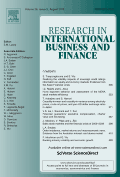
Research in International Business and Finance
Unveiling innovative theories in global finance.Research in International Business and Finance is a premier academic journal published by ELSEVIER, dedicated to advancing the field of international business and finance through high-quality research dissemination. With its ISSN 0275-5319 and E-ISSN 1878-3384, this journal stands out in the international research community, boasting an impressive Q1 ranking in both the Business, Management and Accounting and Finance categories for 2023. The journal aims to stimulate insightful discussions and provide a platform for innovative theories and practices from global perspectives, emphasizing empirical research and critical analysis. As it converges towards 2025, it continues to hold a prominent position in its fields, currently ranking #8 out of 189 in Business and #18 out of 317 in Finance according to Scopus. Although it does not offer open access options, the journal’s rigorous peer-review process ensures that only the most impactful research is published, making it an essential resource for researchers, professionals, and students striving for excellence in international business and finance.
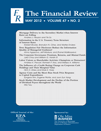
FINANCIAL REVIEW
Your Gateway to High-Impact Financial ResearchFINANCIAL REVIEW, a premier journal in the fields of Economics and Finance, is published by Wiley and has been contributing to the body of knowledge since its inception in 1969. With an impressive track record reflected by its Q1 ratings in both Economics and Econometrics as well as Finance, this journal stands out as a crucial resource for researchers, professionals, and students alike. The journal hosts a diverse array of scholarly articles that not only address contemporary financial issues but also provide innovative insights into economic theories and practices. Although it does not offer open access, its high impact factor and strong Scopus rankings—ranking #275 out of 716 in Economics and Econometrics and #125 out of 317 in Finance—underscore its significance in advancing academic discourse and influencing policy in the financial sector. Researchers are encouraged to explore the latest findings and methodologies shared in this esteemed journal, ensuring they remain at the forefront of their fields.